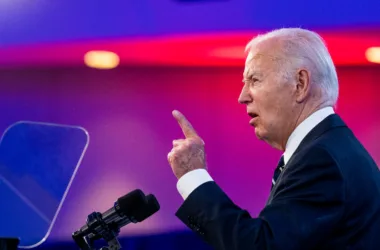In the 60 seconds others use to advertise a car wash or dining spot on the radio, Lon Solomon gives listeners something else: a cultural comment tied to the Christian Gospel, one intended to spur deeper thought.
“Not a Sermon, Just a Thought,” heard in the Washington area for the last 26 years, is the now-familiar tagline for the commercials, which are branching out nationwide.
Starting in 1997 on Howard Stern’s former radio home, WJFK-FM, Mr. Solomon, the 75-year-old retired senior pastor of McLean Bible Church — who says he has “the perfect face for radio” — has delivered a pithy pitch for Jesus that references a song by Paul Simon or the Eagles, or a declaration from Madonna.
Quoting Mr. Simon’s classic song “America” and its line, “I’m empty and aching and I don’t know why,” Mr. Solomon tells listeners, “I was that way, too,” before he found faith in Christ and began a now 50-year Christian journey.
Surprising listeners doesn’t faze him. He no longer speaks weekly from the pulpit in McLean, but millions still hear his voice, which is the goal of the minute-long “Not a sermon, just a thought” radio spots.
While many retirees would work on their golf game or take up pickleball, Mr. Solomon is working to expand his “Not a Sermon” advertising reach. Each quarter, his nonprofit, Lon Solomon Ministries, funds a 13-week “flight” of spots in two different cities such as Seattle and Portland, Ore. The goal is to rotate the placements and cover the nation.
“We’ve already done Chicago and Atlanta,” he said.
Mr. Solomon, who describes his former self as “a secular Jewish person on drugs” living in Chapel Hill, North Carolina, as a college student, said neither he nor “my drug buddies” would have entered a church. While someone did eventually reach him with the Christian message, he recalled, a larger world needed to hear it. But how?
“As I thought about it, I thought, you know, it’s real simple,” Mr. Solomon said. “I have to stop asking these people to come onto my turf. I have to go on there and meet them where they are and talk to them where they are.”
Thus was born the “Not a sermon” ads, 46 seconds of original material with a 14-second standard message on how listeners can learn more from his ministry’s website.
Media expert Phil Cooke, a veteran of the Christian market, said Mr. Solomon’s concept is “a great strategy because you can place a short commercial spot like this in front of a far bigger audience than a 30-minute program,” the customary format found on Christian stations.
Mr. Cooke said brevity is essential when reaching a postmodern audience that may be ignorant of the faith’s basics.
“Today, we live in the most distracted culture in the history of the world,” Mr. Cooke said through email. “The average person today sees as many as 10,000 media messages daily, and studies indicate we touch our phones an average of about 245 times a day. So with that overwhelming barrage of media, it’s tough to get a secular audience to watch a 30-minute or more program to listen to your message.”
Mr. Solomon has a template for his messages: “Give them one verse of Scripture. Say something from current events or personages that would illustrate the point of the verse. And just say to them, ‘You know what, you should think about this.’”
The ads — which originally aired during shock-jock Howard Stern’s program when that show aired on WJFK-FM, now a sports-talk outlet — worked. People came to McLean Bible Church, even though Mr. Solomon said that wasn’t the ad campaign’s primary aim.
“It was not to push McLean Bible Church,” Mr. Solomon said. He would mention he was the pastor there so listeners would know the congregation’s name.
“Not a Sermon” isn’t unique in bringing a short spiritual thought to radio listeners. Bishop Michael Burbidge of the Catholic Diocese of Arlington, Virginia, is regularly heard on one-minute spots on WTOP-FM, something the diocese has done “for years,” a spokesperson said.
While Mr. Solomon got the idea in the 1980s, nearly a decade into what would be a 38-year run as senior pastor of the Northern Virginia congregation, he wasn’t able to move forward until 1991, after McLean Bible Church’s membership split over the idea of becoming more evangelistic toward their secular neighbors.
“We had a vote of confidence in me that I won by eight votes,” Mr. Solomon recalled. “Then most of the people who really didn’t want to have that kind of an outreach approach left and [that] really cleared the decks.”
His other challenge: finding a memorable catchphrase listeners would grasp quickly.
“I couldn’t think of a tagline to save my life,” he said. “I mean, it has to fit with secular society. It’s got to have some double entendre about the Gospel.”
The answer came, he said, while attending a conference in Colorado Springs.
“I’d been praying about this, thinking about this, I was driving myself crazy,” he said. “I was in bed one morning, and it was like somebody whispered in my ear, ‘Not a sermon, just a thought.’”
He credits God with the inspiration and said to his church leaders, “I’m telling you, the Holy Spirit whispered in my ear. … It was not me. I did not come up with this. I’m as surprised by it as you were.”
He said there was initial resistance at WASH-FM, where the general manager questioned whether church-state separation issues would apply.
Mr. Solomon told the executive, “Unless [the ad is] obscene, it’s a First Amendment issue — and WJFK is doing it.” The station relented, as did WTOP, where he said executives also balked at first.
There’s still occasional opposition, he said. In a recent attempt to buy air time in San Francisco, one radio chain’s stations turned him down, but outlets owned by another broadcast group said yes.
Mr. Solomon says conveying an evangelistic call remains at the center of his effort.
“This wasn’t about the church,” he said. “This was about Jesus, bringing people to Jesus. I didn’t care if they ever came to church, but I cared if they came to Christ.”









